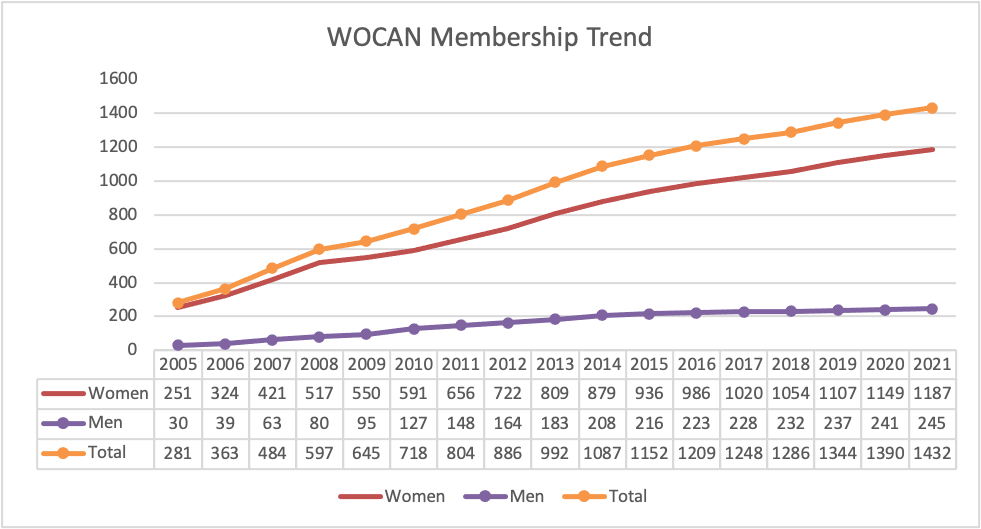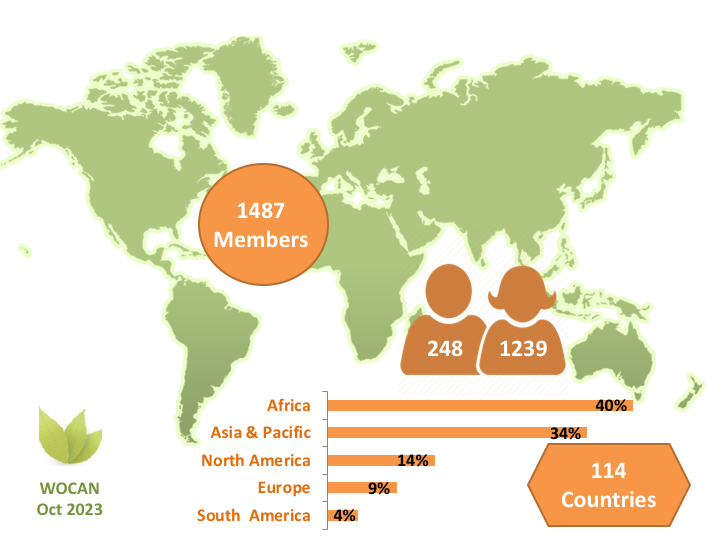Since 2005, WOCAN membership has been growing steadily. On December 2021, WOCAN has 1432 members (1177 women and 245 men). Forty percent are from Africa, 34% from the Asia & Pacific region, 14% from North America, 9% from Europe, and 4% from South America.

WOCAN’s individual members are trainers, policy advisers, researchers/academics, students, extension agents, heads of government departments or divisions, consultants, directors/coordinators, donor representatives, and staff of international and local organizations with backgrounds in agriculture, forestry, livestock, fisheries, anthropology, sociology, economics, environmental sciences, development studies, geography and other disciplines. They are engaged in research, training/teaching, project implementation, monitoring and evaluation, management, advocacy, leadership/network building, and fundraising.
Members have varying levels of gender awareness and skills; many women members state that they are the only females in their organizations or departments, others wish to learn about gender and organizational change from their association with WOCAN. Many have formal gender responsibilities in their organizations and universities, and wish to join a network to learn and share more about gender and NRM. All have a commitment to gender equality and women’s empowerment, related to the agriculture and natural resource management sectors.
The men who have joined are looking for ways to integrate gender into their work, and offering their help to build our network of gender-sensitive professional women and men.
Members have offered their voluntary contributions as trainers, consultants, researchers, fund raisers, proposal writers, hosts for meetings, time to act as focal points, sources of expertise on gender relations in their countries, etc. A typical example is a contribution specified by a Kenyan agriculturalist to “provide knowledge and professional expertise to other women who might not have the same in projects they are working in.” This demonstrates the spirit of mentoring that WOCAN wishes to foster amongst communities of professional women working in agriculture and NRM throughout the world. WOCAN also uses the membership database to identify potential partners and consultants for its programs; identified members may be asked to provide their CVs.
| Top 10 Countries of WOCAN Members | Top 5 Fields of Gender Expertise | Top 5 Fields of Study |
|---|---|---|
| UNITED STATES | Gender and agriculture/food security | Agriculture |
| NEPAL | Gender and land rights | Water |
| INDIA | Gender and water | Geography |
| KENYA | Gender and forestry | Development Studies |
| NIGERIA | Gender and HIV/AIDS | Environmental Studies |
| CAMEROON | Top 5 Gender Responsibilities | Top 5 Types of Expertise |
| SOUTH AFRICA | Gender Training | Research |
| UGANDA | Gender Project implementation | Training/Teaching |
| GHANA | Gender Research | Project Implementation |
| PAKISTAN | Gender Mainstreaming | Management |
| Gender and M&E | Monitoring and Evaluation |
Both individual and organizational members shall have the right to participate, subject to rules established by the Board and the Bylaws, in programs and activities of the organization. Individual members shall have the right to:
Membership payments support the maintenance of the WOCAN website, help to purchase administrative resources, fund regional WOCAN meetings, ensure WOCAN staff representation at international meetings and support other WOCAN activities.
Individual membership rates:
Institutional membership rates:
WOCAN is a women-led international membership network of women and men professionals and women’s associations.
